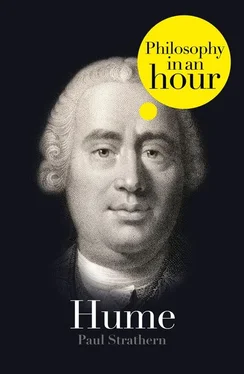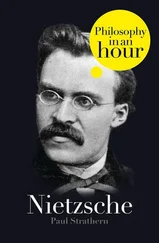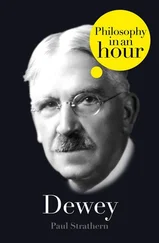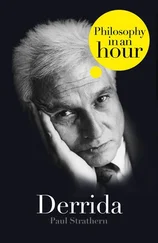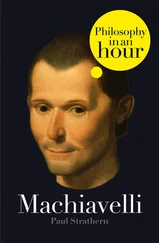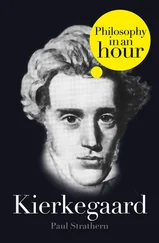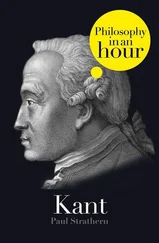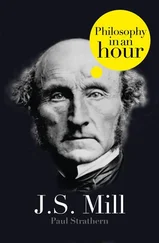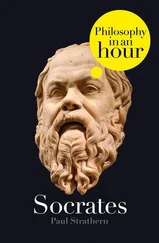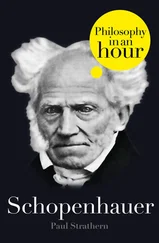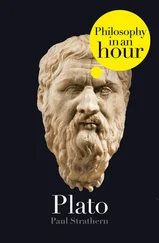Hume was brought up by his uncle, the local parish minister, who had succeeded the philosopher’s father as the laird of Ninewells. Conditions at Ninewells would have appeared austere and primitive by modern standards: barefoot servants; the lower floor of the building containing the winter cowsheds and chicken runs; a diet based heavily on oatmeal, porridge, and kale (a nourishing traditional broth, or a disgusting watery cabbage soup, depending upon your taste). But Hume didn’t feel that his childhood was deprived, either at the time or later. He was educated in the local schoolmaster’s cottage with neighboring village children, in the egalitarian Scottish tradition that for so long surpassed its counterpart south of the border. Then, from the age of twelve to fifteen, he went to Edinburgh University. (Such early entry to Edinburgh University was quite normal at the time, a tradition that is maintained to this day in the demeanor of its students.)
After this, Hume was expected to study law. But he was already inclined otherwise and began reading voraciously over a wide range of subjects. Only with extreme reluctance did he devote any time at all to studying for the bar. This conflict continued for the next three years. Gradually Hume’s reading began to concentrate more and more upon philosophy, until one day ‘there seem’d to be open’d up to me a New Scene of Thought’. His philosophical ideas were beginning to crystallise, and he conceived the idea of writing down a system. By now the law ‘appear’d nauseous to me’, and eventually he decided to give it up altogether.
This was no easy decision. It meant he was abandoning the chance of earning a professional living. The long inner struggle over this decision cost Hume dearly, and shortly afterward he had a nervous breakdown.
Hume went back to Ninewells, but his recovery was only intermittent. Between bouts of depression he continued excitedly pursuing his new ideas. The local physician was called in several times and was of the opinion that Hume was suffering from ‘the Disease of the Learned’. He prescribed ‘a Course of Bitters & Anti-hysteric pills’. He also advised Hume to take ‘an English Pint of Claret every day’ and regular exercise in the form of long horseback rides.
Until now Hume had been tall and thin: a gawky fellow with gangling limbs. Yet despite his regimen of exercise, he now began putting on weight. On his daily rides into the bare, hilly countryside the horse became thinner as its rider expanded – gradually becoming the portly figure he was to remain for the rest of his life. This suggests that Hume’s troubles during this period may in part have been glandular.
Hume’s recovery was only gradual and may in fact never have been complete. Certain mysterious episodes during his later life suggest recurrent mental instability.
Hume had no wish to continue living with his mother at Ninewells forever. In 1734 a friend of the family found him a job as a clerk to a shipping merchant in Bristol. His motives for taking this job were various. He certainly needed the money. He also understood that the job would involve foreign travel. This appealed to his sense of adventure, and he also felt it would be beneficial for his mental health.
There is strong evidence that this continued to worry him. On his way to Bristol, Hume passed through London. Here he composed a long letter to Dr. Arbuthnott, one of the leading physicians of the day. In it, Hume does his best to describe his illness, though this description is severely hampered by the limited knowledge and inadequate concepts of the day. He describes his disease as ‘this Distemper’, and refers to his ‘inflam’d Imaginations’. He says: ‘I was continually fortifying myself with Reflections against Death, & Poverty, & Shame, & Pain, & all the other Calamities of Life.’ After outlining the remedies prescribed by his physician, he passes inconsequentially to some philosophical reflections: ‘I believe ’tis a certain fact that most of the Philosophers who have gone before us, have been overthrown by the greatness of their genius, & that little more is requir’d to make a man succeed in this Study than to throw off all Prejudices either for his own Opinions or for this of others.’ Hume ends by asking various questions about his illness (‘Whether I can hope for a Recovery?’), which he answers himself (‘Assuredly you can’). And this appears to have done the trick. Hume never sent his ten page letter (though he kept it all his life). He seems to have found that the mere writing of it was a cure in itself. Or at least as near a cure as he would ever find.
Hume now settled down to work in Bristol and discovered that his job as a clerk was unlikely to involve any foreign travel. Relations with his employer gradually deteriorated, and eventually he left his job. By his twenty-fourth birthday he was back at Ninewells, where he began to get a bad name for his ‘superior and irreligious ways’. By this stage Hume had inherited a small private income of forty pounds sterling a year, which enabled him to live frugally without having to work.
He now set about writing down his philosophical observations, with the aim of creating a new philosophy which would make him famous. (Throughout his life Hume made little secret of his ultimate aim: ‘my love of literary fame, my ruling passion’. And it was as a literary figure, more than as a philosopher, that Hume was to achieve fame. In later life Boswell was to refer to him as ‘the greatest writer in Britain’, and to this day he is listed in the British Library catalogue as ‘David Hume, the historian.’) After a few months Hume decided to set off for France. Here he could live well on his small private income, and in isolation he would be able to concentrate on his new philosophy without interruption or speculations of a more practical nature. (At Ninewells there was always mother and his uncle, neither of whom were philosophy fans.)
There is a story that Hume left Ninewells in a hurry. Not long after he went to France an unmarried young local woman called Agnes, who was said to have ‘a bad record with such matters’, announced that she was pregnant. The attitude toward this kind of thing in Scotland at the time was all very Christian. Poor deserted Agnes was exhibited at church, where the parish minister (Hume’s uncle) delivered the customary public denouncement, which ended with the pious hope that she would die in childbirth. As if this display of compassion and Christian love were not enough, Agnes was then hauled before the sessions, where she almost certainly received a further punishment – again, probably involving some kind of public humiliation, always a favoured method of retribution in a hypocritical society. (I’m told that this is due to unconscious masochism: the thrill induced by the fact that you haven’t yet been caught.) During the course of Agnes’s examination at the session, she eventually named the absent Hume as the father of her unborn child – probably to protect the real father. This was the sessions’ firm conviction, at any rate. We will never know the truth.
With one notable exception, this is the main evidence we have of Hume’s sexual inclinations. According to Mossner, Hume ‘in later life, in Italy and France and Scotland, was to prove a man of normal sexual desires’. Since not much else is recorded about these sexual desires, one can only assume they were fulfilled by hospitality – with enthusiastic chambermaids and demanding hostesses. And since Hume is one of the few literary figures of the age who didn’t catch the pox, it’s unlikely that this hospitality was very frequent, or that he went with whores, who at the time were cheaper than hot water bottles. (This latter is intended as a purely socioeconomic observation, with no sexist undertones. These disease-ridden human hot water bottles would in most cases have arrived at their condition after suffering the same fate as Agnes, victims of the hypocrisy so necessary to any upright society of closet masochists.)
Читать дальше
